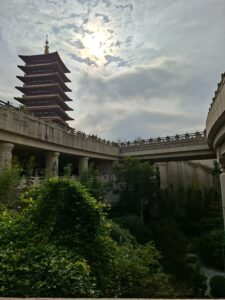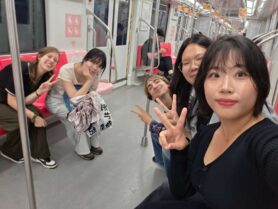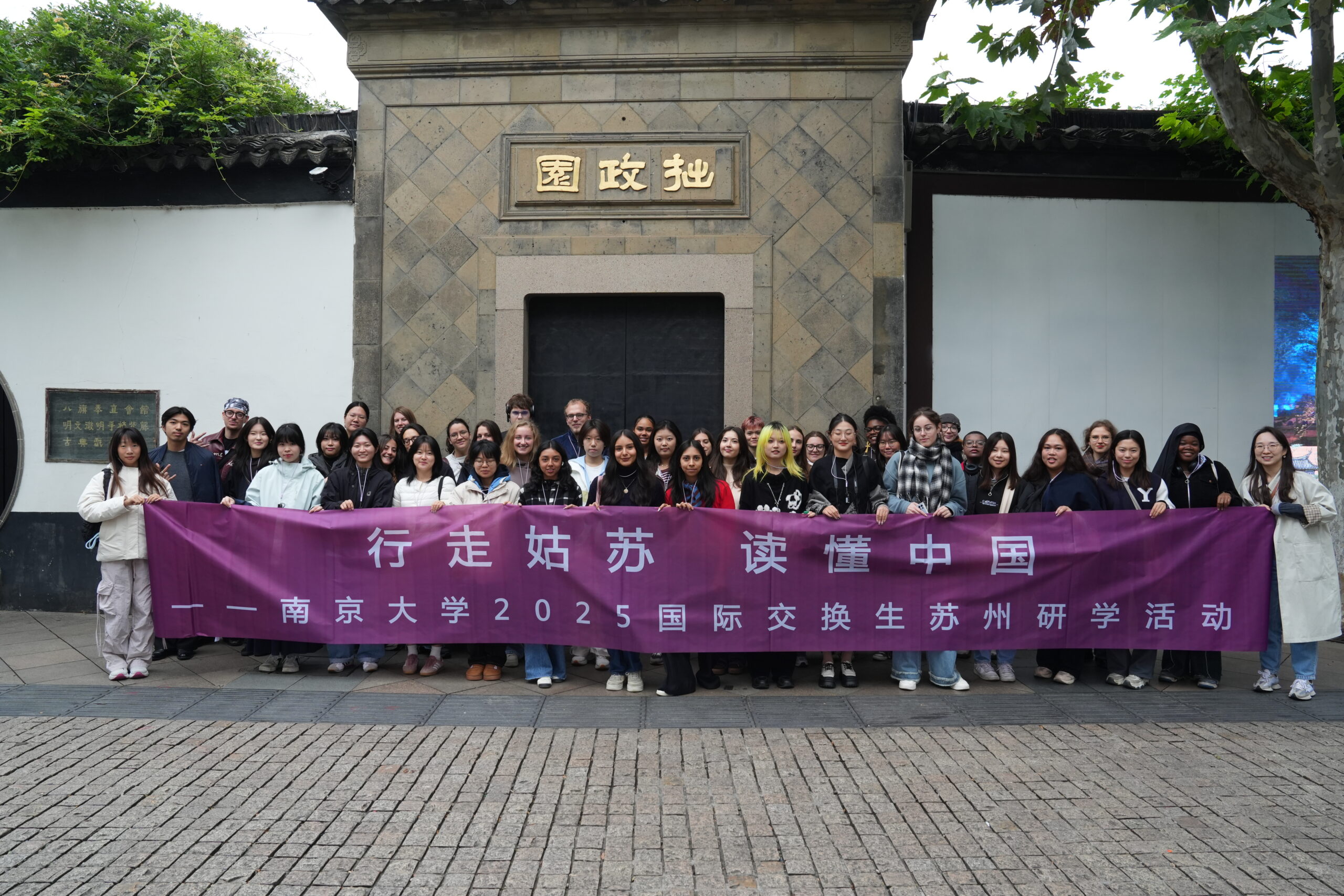Blog
Studying Abroad Alongside Humanities Honours

University: Nanjing University
Field of study at home: history
Courses in China: Language, intercultural learning
Studying Abroad Alongside Humanities Honours
By Indira Franken
Nanjing is a vibrant and bustling city in the East of China and an ideal place for an exchange semester. 南京大学 (Nanjing University) is an esteemed University in China and offers many English-taught courses, as well as a Chinese language course designed for international students. Additionally, the city is smaller and less influenced by the West than cities like Beijing and Shanghai, forcing you to step out of your comfort zone and speak Mandarin in a wide range of situations. For me, and many of the people that I meet here, this makes Nanjing an ideal place to learn Mandarin and have an intercultural experience.
Rather than spending all the following words on convincing you to visit Nanjing, I wish to tell you a little more about my experience here so far and why an exchange can be a valuable addition to a Bachelor’s and to the Humanities Honours programme. Going on an exchange has been an amazing opportunity for me, and I am extremely lucky to be here. For those who are presented with a similar opportunity, it is certainly worth considering.
There is no better way to learn a new language than by surrounding yourself with that language. As humanities students, we know how important it is to understand communication and the space between languages. Language carries much history and is, in itself, one perspective on the world around us. The more languages you understand, the more perspectives are presented to you. However, in the Netherlands, I felt stuck with my Mandarin progress. Learning a language remotely remains disconnected from the context in which it develops. There is therefore no better way to acquire and better understand a language than going to a place where people around you actively speak it. An exchange is just the opportunity to do this within your bachelor’s.
A second finding of mine, now that I am here, is that confronting a different culture makes you reflect on your values and your position in the world. Perhaps international students in the Humanities Honours Programme have experienced this in Utrecht as well. Daily social interactions function slightly differently in every place I go. My course, ‘Intercultural Learning,’ asked me to reflect upon a critical encounter. I gave the following example:
I was walking on the street last month when I saw an elderly woman carrying many bags. She stood still in the middle of the road, trying to fit multiple bags into one so she could carry them more easily. She had some difficulty doing so, so I stopped to help her put the bags together and handed them to her, ensuring she didn’t have to bend over to pick them up.
What I did not foresee, however, was that in China, help, no matter how small, is to be repaid. The woman lifted one of her bags, fished out a smaller plastic bag filled with green grapes, and promptly offered them to me. I refused, but she told me that she had bought way too many grapes to eat and that I would need them more. I refused again because it is customary to refuse a gift in China. You have to put up a fight before reluctantly receiving an offer. Just taking a gift is seen as rude. We must have gone back and forth for several minutes there, in the middle of the road, before the lady all but threw the bag into my arms and started powerwalking the other way. I was left confused and with a bag of grapes.
Daily interactions like this, that go a different way than I expect, help me reflect on practices like gratitude and how they differ from culture to culture. I think this can help me rethink concepts such as ‘normal’ and ‘weird’ and engage with them critically.
Additionally, differences between student life and universities offer me an opportunity to reflect on how culture and borders influence academia. In the Honours programme, we speak a lot about interdisciplinarity. How do we bridge the gap between fields to add a new or more complex layer of meaning to research? Similarly, academia operates differently across universities and countries. I believe that this aspect is intrinsically connected to interdisciplinarity but often overlooked. A better understanding of intercultural research is therefore valuable for the Humanities Honours Programme.
However, I also wish to add that alongside the differences, similarities call for equal reflection. Here, I am often more confronted with similarities than I am differences. Yes, small things are different. You eat a warm lunch instead of a bammetje kaas, you use your phone for everything from ordering food to getting through gates, and your coffee will cost as much as a dinner. But when all is said and done, even though I am halfway across the world, people are going to work or school and are breathing just the same as back home. Everybody is just living the same beautifully mundane life as you.
This forces me to reflect on our perceptions of what is ‘other’ and on how we conceptualise the cultures and places outside our own. This is perhaps the most valuable reflection I take away from my experience.
Going on an exchange is also just heaps of fun. I have visited many interesting and beautiful places and made many valuable connections. The friends I have made here, both internationals and Chinese students, keep me on my toes in discussions about my research and culture. Going for a semester abroad does not delay your studies and fits within, I would even say complements, the Humanities Honours Programme. If you do decide to come to Nanjing, you must visit 老门东, and do not be afraid of elderly ladies approaching you to take a picture with ‘the foreigner’.
Greetings from China <3
Studying Abroad Alongside Humanities Honours
By Indira Franken
Nanjing is a vibrant and bustling city in the East of China and an ideal place for an exchange semester. 南京大学 (Nanjing University) is an esteemed University in China and offers many English-taught courses, as well as a Chinese language course designed for international students. Additionally, the city is smaller and less influenced by the West than cities like Beijing and Shanghai, forcing you to step out of your comfort zone and speak Mandarin in a wide range of situations. For me, and many of the people that I meet here, this makes Nanjing an ideal place to learn Mandarin and have an intercultural experience.
Rather than spending all the following words on convincing you to visit Nanjing, I wish to tell you a little more about my experience here so far and why an exchange can be a valuable addition to a Bachelor’s and to the Humanities Honours programme. Going on an exchange has been an amazing opportunity for me, and I am extremely lucky to be here. For those who are presented with a similar opportunity, it is certainly worth considering.
There is no better way to learn a new language than by surrounding yourself with that language. As humanities students, we know how important it is to understand communication and the space between languages. Language carries much history and is, in itself, one perspective on the world around us. The more languages you understand, the more perspectives are presented to you. However, in the Netherlands, I felt stuck with my Mandarin progress. Learning a language remotely remains disconnected from the context in which it develops. There is therefore no better way to acquire and better understand a language than going to a place where people around you actively speak it. An exchange is just the opportunity to do this within your bachelor’s.
A second finding of mine, now that I am here, is that confronting a different culture makes you reflect on your values and your position in the world. Perhaps international students in the Humanities Honours Programme have experienced this in Utrecht as well. Daily social interactions function slightly differently in every place I go. My course, ‘Intercultural Learning,’ asked me to reflect upon a critical encounter. I gave the following example:
I was walking on the street last month when I saw an elderly woman carrying many bags. She stood still in the middle of the road, trying to fit multiple bags into one so she could carry them more easily. She had some difficulty doing so, so I stopped to help her put the bags together and handed them to her, ensuring she didn’t have to bend over to pick them up.
What I did not foresee, however, was that in China, help, no matter how small, is to be repaid. The woman lifted one of her bags, fished out a smaller plastic bag filled with green grapes, and promptly offered them to me. I refused, but she told me that she had bought way too many grapes to eat and that I would need them more. I refused again because it is customary to refuse a gift in China. You have to put up a fight before reluctantly receiving an offer. Just taking a gift is seen as rude. We must have gone back and forth for several minutes there, in the middle of the road, before the lady all but threw the bag into my arms and started powerwalking the other way. I was left confused and with a bag of grapes.
Daily interactions like this, that go a different way than I expect, help me reflect on practices like gratitude and how they differ from culture to culture. I think this can help me rethink concepts such as ‘normal’ and ‘weird’ and engage with them critically.
Additionally, differences between student life and universities offer me an opportunity to reflect on how culture and borders influence academia. In the Honours programme, we speak a lot about interdisciplinarity. How do we bridge the gap between fields to add a new or more complex layer of meaning to research? Similarly, academia operates differently across universities and countries. I believe that this aspect is intrinsically connected to interdisciplinarity but often overlooked. A better understanding of intercultural research is therefore valuable for the Humanities Honours Programme.
However, I also wish to add that alongside the differences, similarities call for equal reflection. Here, I am often more confronted with similarities than I am differences. Yes, small things are different. You eat a warm lunch instead of a bammetje kaas, you use your phone for everything from ordering food to getting through gates, and your coffee will cost as much as a dinner. But when all is said and done, even though I am halfway across the world, people are going to work or school and are breathing just the same as back home. Everybody is just living the same beautifully mundane life as you.
This forces me to reflect on our perceptions of what is ‘other’ and on how we conceptualise the cultures and places outside our own. This is perhaps the most valuable reflection I take away from my experience.
Going on an exchange is also just heaps of fun. I have visited many interesting and beautiful places and made many valuable connections. The friends I have made here, both internationals and Chinese students, keep me on my toes in discussions about my research and culture. Going for a semester abroad does not delay your studies and fits within, I would even say complements, the Humanities Honours Programme. If you do decide to come to Nanjing, you must visit 老门东, and do not be afraid of elderly ladies approaching you to take a picture with ‘the foreigner’.
Greetings from China <3


